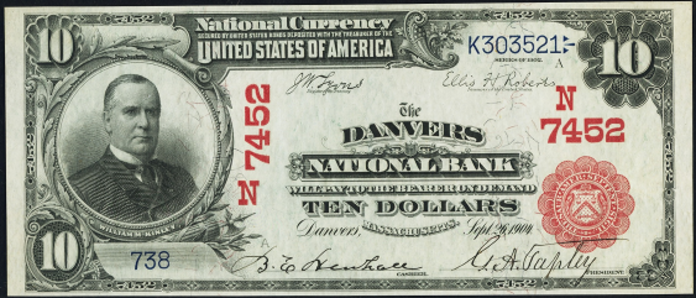Ten Dollar Notes › Nationals › 1902 Ten Dollar National Bank Notes › Tennessee Charters › 1902 $10 Lexington Tennessee First National Bank
Get Value Now
| Item | Info |
|---|---|
| Series | 1902 |
| Charter | #12324 First National Bank of Lexington, Tennessee |
| Year Chartered | 1923, 194 Banks Chartered |
| City Info | Lexington is a city in Henderson County, Tennessee, United States. Lexington is midway between Memphis and Nashville, lying ten miles south of Interstate 40, which connects the two cities. The population was 7,473 at the 2010 census. It is the county seat of Henderson County. Source: Wikipedia |
| Similar Cities | 19 banks with similar city. First 12 below: 1. Lexington, Kentucky - First National Bank 2. Lexington, Kentucky - First and City National Bank 3. Lexington, Kentucky - Fayette National Bank 4. New Lexington, Ohio - First National Bank 5. Lexington, Kentucky - National Exchange Bank 6. Lexington, Illinois - First National Bank 7. Lexington, Kentucky - Second National Bank 8. Lexington, Kentucky - Phoenix and Third National Bank 9. Lexington, Nebraska - First National Bank 10. Lexington, Kentucky - Phoenix National Bank 11. Lexington, Nebraska - Dawson County National Bank 12. Lexington, Virginia - First National Bank |
| Seal Varieties | Red, Blue |
| See Also | If your note doesn't match try: 1. 1907 $10 Gold Certificate 2. 1901 $10 Legal Tender 3. 1908 $10 Silver Certificates |
| Other Info | 1. Value depends on notes known for charter, condition and market demand. |
| Neat Fact | Notes of Aldrich-Vreeland Period (1908-1915) contain inscription "Secured by United States bonds or other securities" (Friedbergs, 20th Ed. P 100) |
No Obligations Offers and Appraisals
Please submit a good photo or scan. It will be identified and evaluated. Understand there may be subtle differences between the image you see above and your note. Signatures, design, markings and note condition will determine the offer price. Notes in Uncirculated or better condition receive the best offers.
Appraisals can be estimated for wholesale and retail prices. Wholesale is what dealers typically pay. Retail is what a collector might pay. Retail is slightly higher in most cases.
Please visit this page for USA Paper Money Reference. Do not treat this page as a reference guide, it is for appraisal and acquisition purposes only.
